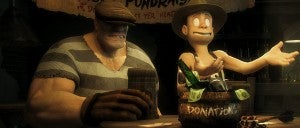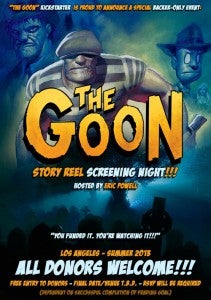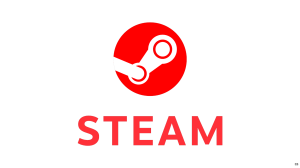It’s Halloween, so what better day to consider the merits of a movie that features violence, zombies, and the occasional knife to the eye?That’s right, folks–Eric Powell’s beloved Dark Horse Comics series The Goon is still winding its way toward the big screen, and the most recent step in that journey is that they’ve launched a Kickstarter campaign aimed at raising $400,000 to provide Hollywood studios with a test reel–rudimentary animation, music and sound effects. This will make selling the film to a potential backer much easier, which is necessary becuase the actual budget for an animated feature film, especially one that matches up, quality-wise, with what Blur have offered in the trailer and sample scene that’s been floating around the Internet for a while, costs substantially more than you can easily raise on Kickstarter.Not that even this much is “easy.” But Fight Club and The Social Network director David Fincher is attached to the film, which helps open a lot of doors. The folks at Blur are pretty convinced that this story reel could be the missing piece to interesting a studio.Plus, now everyone can stop asking Eric Powell why they don’t just fund the thing with Kickstarter.Blur’s Tim Miller and Jeff Fowler joined us to talk about the film, the fundraising campaign, and the challenges they’ve faced along the way.But first, of course, check out the trailer to get a sense for what we’re talking about.There’s a ton more to this conversation, too, but we’re making strategic cuts, here. We’re going to run it by Blur, and if they’re down, you’ll get a full, in-depth recording of the conversation on an episode of Panel Discussions Friday morning.
The Goon Movie: The Case For Kickstarter With Blur Studios
It’s Halloween, so what better day to consider the merits of a movie that features violence, […]












